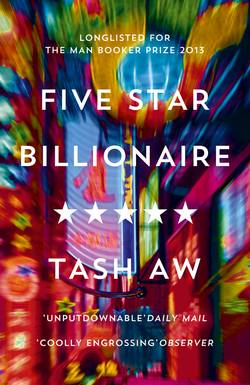Читать книгу Five Star Billionaire - Tash Aw - Страница 6
Foreword: How to be a Billionaire
ОглавлениеSome time ago – I forget exactly when – I decided that I would one day be very rich. By this I mean not just comfortably well off but superabundantly, incalculably wealthy, the way only children imagine wealth to be. Indeed, nowadays, whenever I am pressed to pinpoint the time in my life when these notions of great fortune formed in my head, I always answer that it must have been sometime in my adolescence, when I was conscious of the price of life’s treasures but not yet fully aware of their many limitations, for there has always been something inherently childlike in my pursuit of money – that much I admit.
When I was growing up in rural Malaysia, one of my favourite TV programmes was a drama series set in a legal practice somewhere in America. All the details – the actors, the plots, the setting – are lost to me now, blurred not just by the passage of time but by a haze of bad subtitles and interrupted transmissions (the power generator and the aerial took it in turns to malfunction with crushing predictability, though in those days it seemed perfectly normal). I am not certain I could tell you what happened in a single episode of that soap opera, and besides, I did not care for the artificial little conflicts that took place all the time, the emotional ups and downs, men and women crying because they were falling in love, or out of love; the arguing, making up, making love, etc. I had a sensation that they were wasting time, that their days and nights could have been spent more profitably; I think I probably felt some degree of frustration at this. But even these are fleeting impressions, and the only thing I really remember is the opening sequence, a sweeping panorama of metal-and-glass skyscrapers glinting in the sun, people in sharp suits carrying briefcases as they vanished into revolving doors, the endless rush of traffic on sunlit freeways. And every time I sat down in front of the TV I would think: One day, I will own a building like that, a whole tower block filled with industrious, clever people working to make their fantasies come true.
All I cared for were these introductory images; the show that followed was of secondary importance to me.
So much wasted time.
Now, when I look back at those childhood fantasies, I chuckle with embarrassment, for I realise that I was foolish: I should never have been so modest in my ambitions, nor waited so long to pursue them.
It is said that the legendary tycoon Cecil Lim Kee Huat – still compos mentis today at 101 – made his first profit at the age of eight, selling watermelons off a cart on the old coast road to Port Dickson. At thirteen he was running a coffee stand in Seremban, and at fifteen, salvaging and redistributing automobile spare parts on a semi-industrial scale, a recycling genius long before the concept was even invented. Small-town Malaya in the 1920s was not a place for dreams. He was eighteen and working as an occasional porter in the Colony Club when he had the good fortune to meet a young Assistant District Officer from Fife called MacKinnon, only recently arrived in the Malay States. History does not record the precise nature of their relationship (those ugly rumours of blackmail were never proved); and in any event, as we will see later, imagining the whys and wherefores of past events, the what-might-have-beens – all that is pointless. The only thing worth considering is what actually happens, and what happened in Lim’s case was that he was left with enough money upon MacKinnon’s untimely death (in a drowning accident) to start the first local insurance business in Singapore, a small enterprise that would eventually become the Overseas Chinese Assurance Company, for so long a bedrock of the Malaysian and Singaporean commercial landscape until its recent collapse. We can learn much from people like Lim, but his case study would involve a separate book altogether. For now, it is sufficient to ask: What were you doing when you were eight, thirteen, fifteen, and eighteen? The answer is, I suspect: Not very much.
In the business of life, every tiny episode is a test, every human encounter a lesson. Look and learn. One day you might achieve all that I have. But time is sprinting past you, faster than you think. You’re already playing catch-up, even as you read this.
Fortunately, you do get a second chance. My advice to you is: Take it. A third rarely comes your way.
